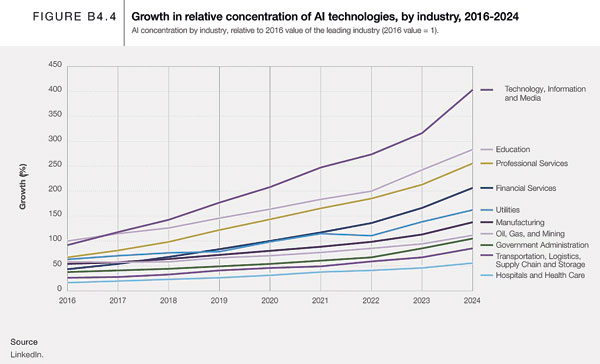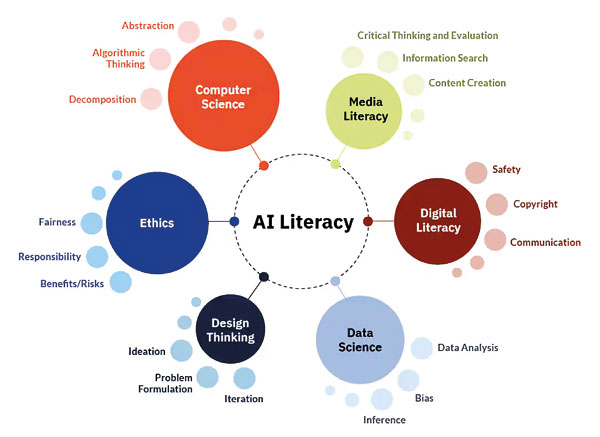Why AI literacy is now a core competency in education
View(s):Key Takeaways
Education systems must go beyond digital literacy and embrace AI literacy as a core educational priority.
A new AI Literacy Framework (AILit) aims to empower learners to navigate an AI-integrated world with confidence and purpose.
Here’s what you need to know about the AILit Framework – and how to get involved in making it a success.
Artificial intelligence is no longer a niche innovation—it has become a transformative force, reshaping the way we live, work, and learn.
According to the World Economic Forum’s Future of Jobs Report 2025, AI is set to impact nearly every sector, driving a shift in the skills needed across the global workforce.

Its greatest impact is seen in how we access, interpret, and apply information revolutionising education and the process of learning itself.
In this context, AI literacy is no longer just an added advantage for tech professionals; it’s becoming a foundational component of human development, with profound implications for the future of education.
Despite the rapid pace of technological advancement, education systems often struggle to keep up.
The AI Literacy Framework (AILit) seeks to bridge this widening gap. Developed through a collaboration between the European Commission (EC) and the Organisation for Economic Co-operation and Development (OECD), with backing from Code.org and global experts, the framework marks a significant step toward equipping the next generation to engage with AI thoughtfully, ethically, and innovatively.
As the OECD emphasises, this initiative goes beyond simply teaching coding or explaining algorithms. It focuses on cultivating a broad set of skills and understandings that enable students to confidently and responsibly participate in an AI-driven world.
Why AI Literacy – and Why Now?
With generative AI tools becoming increasingly embedded in classrooms, workplaces, and everyday digital experiences, it’s more important than ever to promote responsible use from an early age. Young people are not just interacting with AI—they’re actively exploring it, often without structured education around its risks and limitations.
A 2024 report by TeachAI and EY found that nearly half of Gen Z struggled to critically assess AI technologies, including understanding that AI systems can fabricate information.
This concern is echoed in the World Economic Forum’s Shaping Learning: The Role of AI in Education report, which argues that education must evolve beyond traditional digital literacy. Instead, AI literacy should be a fundamental focus—teaching students to critically assess AI outputs, harness their creativity in collaboration with AI, and apply ethical reasoning when considering its influence on society.
What the AILit Framework Offers
Currently in its draft stage, the AILit Framework defines AI literacy as a combination of knowledge, skills, and mindsets that empower learners to use AI responsibly and effectively. It is structured around four practical and interconnected domains:
Engaging with AI – Recognising the presence of AI in everyday technologies and critically assessing the reliability of its outputs.
Creating with AI – Using AI tools to enhance creativity and problem-solving, while reflecting on ethical considerations such as bias, authorship, and responsibility.
Managing AI’s Actions – Assigning tasks to AI thoughtfully, setting clear parameters, and maintaining human oversight and accountability.
Designing AI Solutions – Understanding the fundamentals of AI systems and learning how to develop or adapt them to address real-world challenges.

The framework includes 23 specific competencies along with ready-to-use classroom learning scenarios. It is both visionary and practical—intended not only for computer science education but for integration across all subjects, from the arts and languages to social sciences—positioning AI as a foundational theme throughout the education system.
Global Insight for the Classroom
A key strength of the AILit Framework is its grounding in international expertise. It draws from leading research initiatives like AI4K12, UNESCO, and the EU’s DigComp frameworks—synthesising existing knowledge into a practical tool tailored for use in primary and secondary education.
AILit is also closely aligned with Article 4 of the EU AI Act, which requires that users—including students and teachers—have adequate AI literacy when interacting with AI systems.
In harmony with the Digital Education Action Plan 2021–2027, the framework reinforces the belief that fostering a digitally capable, AI-literate society must begin in the classroom.
A Call to Action for the Education Sector
According to the Future of Jobs Report 2025 by the World Economic Forum, nearly 40% of the skills needed in the global workforce will undergo transformation within the next five years.
To prepare students for this evolving landscape, education must expand beyond traditional subjects to include AI-focused competencies such as algorithmic thinking, prompt design, and recognising bias in data-driven systems.
However, success in an AI-integrated world will also depend on cultivating uniquely human qualities—like empathy, ethical reasoning, sound judgment, and the ability to collaborate.
The AILit Framework is built on these principles, embedding both technical and ethical dimensions into its design. It champions a future-ready, skills-first approach that places human values at the heart of AI education.
HitAd.lk is the best and biggest mobile phone market in Sri Lanka, and we guarantee you will find what you need here from our extensive listing of mobile phones for sale in Sri Lanka. Whether it’s a budget-priced smartphone for communication, or higher end features with advanced connectivity, there are many different options from which to choose from on our site!


